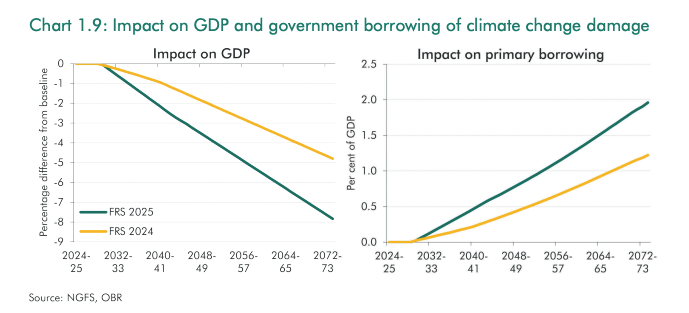At first glance, public investment in electric vehicles (EVs) can seem expensive. Slashing VAT on public charging, funding new infrastructure, or offering tax incentives isn’t cheap, especially in a tight fiscal climate. But what if not investing in EVs costs us more?
The latest report from the Office for Budget Responsibility (OBR) makes one thing clear: inaction on climate change is a far greater threat to the UK’s economy than bold, proactive investment. As we enter a critical period for decarbonisation, now is the time to support, not scale back, the UK’s transition to EVs.
Net Zero: Cheaper Than We Thought
The OBR’s July 2025 report is a watershed moment. For the first time, it presents a side-by-side comparison of what it will cost the UK to reach net zero versus the damage of unchecked global warming. The verdict? Action is not only affordable: it’s essential.
New estimates show the net cost of reaching net zero is now £116 billion over 25 years, around £70 per person, per year. That’s a 64% reduction from earlier projections, largely due to plummeting clean tech costs, especially EVs. At the same time, the forecast for climate-related economic damage has worsened significantly. If global temperatures rise by 3°C, which current policies estimate, the UK economy could shrink by 8% by the 2070s.
Worse still, government borrowing would nearly double compared to a scenario where warming is limited to 2°C. Climate change will hit tax receipts hard through reduced productivity, higher unemployment, and increased pressure on services. The OBR warns that by the 2070s, borrowing could rise by 4.3% of GDP each year, primarily due to the economic damage of inaction.
EVs Are a Critical Part of the Solution
Electric vehicles are central to this economic equation. According to the OBR, fuel duty losses from the EV transition make up the bulk of “lost receipts” on the government’s balance sheet, yet this also reflects the success of the shift to cleaner transport. The more EVs on the road, the fewer emissions from petrol and diesel. The fewer emissions, the less economic harm from climate change.
And the payback goes beyond emissions. EVs are already cheaper to run and maintain than petrol or diesel cars. The Climate Change Committee predicts further savings, including in health, reduced air pollution alone could prevent thousands of premature deaths a year. That’s money saved in NHS budgets, and lives saved in our communities.
The OBR acknowledges that governments could recoup fuel duty losses through alternative taxes, like road pricing, without sacrificing environmental progress. The issue isn’t that EVs cost too much; it’s that our tax system hasn’t caught up with the future of transport.
Public Charging: The Next Barrier to Break
Yet for many, the biggest obstacle to driving electric isn’t cost, it’s convenience. Nearly half of UK households don’t have off-street parking. For them, public charging isn’t optional, it’s essential.
That’s why cutting the VAT rate on public charging from 20% to 5%, in line with domestic energy, is a no-brainer. It levels the playing field, supports renters and lower-income drivers, and accelerates uptake where we need it most.
At char.gy, we see the impact of this inequality every day. Drivers who rely on off-street or destination charging pay significantly more per mile than those who charge at home. The current VAT system punishes people for not owning a driveway. That’s not just unfair; it’s a barrier to net zero.
Policy That Pays Back

The OBR’s message is simple: doing nothing costs more. The price of delay isn’t measured just in tonnes of CO₂, it’s measured in jobs lost, tax receipts missed, and infrastructure overwhelmed by climate extremes.
By contrast, the benefits of moving quickly on EVs and clean transport are tangible: lower running costs for drivers, cleaner air for our cities, and a more resilient economy. Net zero industries already contribute £83 billion to the UK economy and employ nearly a million people.
Slashing VAT on public charging, accelerating the EV rollout, and investing in local infrastructure is not just climate policy, it’s smart economics.
Conclusion: A Clear Choice
The OBR’s latest figures shift the debate. This isn’t about whether we can afford net zero, it’s about whether we can afford not to. EVs are a cornerstone of the UK’s strategy to decarbonise, and every barrier we remove today makes that transition cheaper, fairer, and faster.
It’s time to stop treating EV investment as a luxury. In truth, it’s the most cost-effective insurance policy we’ve got.
